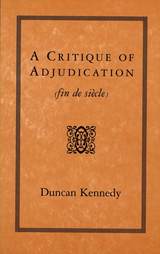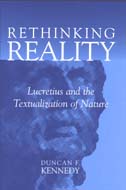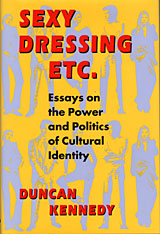
A major statement from one of the foremost legal theorists of our day, this book offers a penetrating look into the political nature of legal, and especially judicial, decision making. It is also the first sustained attempt to integrate the American approach to law, an uneasy balance of deep commitment and intense skepticism, with the Continental tradition in social theory, philosophy, and psychology.
At the center of this work is the question of how politics affects judicial activity-and how, in turn, lawmaking by judges affects American politics. Duncan Kennedy considers opposing views about whether law is political in character and, if so, how. He puts forward an original, distinctive, and remarkably lucid theory of adjudication that includes accounts of both judicial rhetoric and the experience of judging. With an eye to the current state of theory, legal or otherwise, he also includes a provocative discussion of postmodernism.
Ultimately concerned with the practical consequences of ideas about the law, A Critique of Adjudication explores the aspects and implications of adjudication as few books have in this century. As a comprehensive and powerfully argued statement of a critical position in modern American legal thought, it will be essential to any balanced picture of the legal, political, and cultural life of our nation.

The book engages in a sustained argument about realist assumptions in scientific and other discourses through detailed analysis and discussion of some of the most important recent contributions to this debate. Engaging sympathetically but not uncritically with constructivist accounts of scientific knowledge, the book takes up a sustained critique of recent contributions to that debate, including those of Ian Hacking, Evelyn Fox Keller, Bruno Latour, and Hans-Jörg Rheinberger. What are the implications of regarding such knowledge as "discovered" or "invented"? How is the rhetoric of such claims to be identified and the pretentions of those claims assessed?In what ways can realist and constructivist approaches be reconciled? How do these considerations affect the way we read scientific texts from the past and regard them historically?
What emerges is a fresh and challenging assessment of the role of time and temporal perspective in assessing claims to knowledge in scientific thought and of the importance of textuality to the history of knowledge. A wide variety of readers, from classicists and intellectual historians to epistemologists of science, will enjoy and learn from Rethinking Reality.
Duncan Kennedy is Reader in Latin Literature and the Theory of Criticism, University of Bristol. He is also the author of The Arts of Love: Five Studies in the Discourse of Roman Love Elegy.

READERS
Browse our collection.
PUBLISHERS
See BiblioVault's publisher services.
STUDENT SERVICES
Files for college accessibility offices.
UChicago Accessibility Resources
home | accessibility | search | about | contact us
BiblioVault ® 2001 - 2024
The University of Chicago Press









